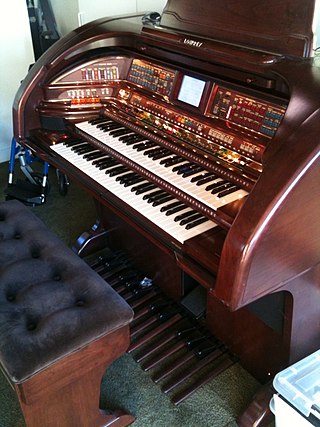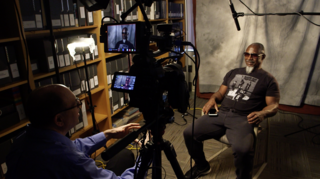
Dobro is an American brand of resonator guitars owned by Gibson and manufactured by its subsidiary Epiphone. The term "dobro" is also used as a generic term for any wood-bodied, single-cone resonator guitar.

KORG Inc., founded as Keio Electronic Laboratories, is a Japanese multinational corporation that manufactures electronic musical instruments, audio processors and guitar pedals, recording equipment, and electronic tuners. Under the Vox brand name, they also manufacture guitar amplifiers and electric guitars.

Oberheim is an American synthesizer manufacturer founded in 1969 by Tom Oberheim.

The Gibson Les Paul is a solid body electric guitar that was first sold by the Gibson Guitar Corporation in 1952. The guitar was designed by factory manager John Huis and his team with input from and endorsement by guitarist Les Paul. Its typical design features a solid mahogany body with a carved maple top and a single cutaway, a mahogany set-in neck with a rosewood fretboard, two pickups with independent volume and tone controls, and a stoptail bridge, although variants exist.

Epiphone is an American musical instrument brand that traces its roots to a musical instrument manufacturing business founded in 1873 by Anastasios Stathopoulos in Smyrna, Ottoman Empire, and moved to New York City in 1908. After taking over his father's business, Epaminondas Stathopoulos named the company "Epiphone" as a combination of his own nickname "Epi" and the suffix "-phone" in 1928, the same year it began making guitars.

Lloyd Allayre Loar (1886–1943) was an American musician, instrument designer and sound engineer. He is best known for his design work with the Gibson Mandolin-Guitar Mfg. Co. Ltd. in the early 20th century, including the F-5 model mandolin and L-5 guitar. In his later years he worked on electric amplification of stringed instruments, and demonstrated them around the country. One example, played in public in 1938 was an electric viola that used electric coils beneath the bridge, with no back, able to "drown out the loudest trumpet."

Henri Selmer Paris is a French enterprise, manufacturer of musical instruments based at Mantes-la-Ville near Paris. Founded in 1885, it is known as a producer of professional-grade woodwind and brass instruments, especially saxophones, clarinets and trumpets. Henri Selmer Paris used to be family-owned but was sold to Argos-Wityu in 2018.

Hamer Guitars was an American electric guitarmanufacturer founded in 1973, in Wilmette, Illinois, by vintage guitar shop owners Paul Hamer and Jol Dantzig. The company's early instruments featured guitar designs based on the Gibson Explorer and Gibson Flying V (Vector), before adding more traditional Gibson-inspired designs such as the Sunburst. Hamer Guitars is generally considered the first "boutique" vintage-style electric guitar brand that specifically catered to professional musicians, and was the first guitar manufacturer to produce a 12 string bass guitar.

The Echoplex is a tape delay effect, first made in 1959. Designed by Mike Battle, the Echoplex set a standard for the effect in the 1960s—it is still regarded as "the standard by which everything else is measured." It was used by some of the most notable guitar players of the era; original Echoplexes are highly sought after.
Matsumoku Industrial was a Japanese manufacturing company based in Matsumoto, Nagano, between 1951 and 1987. Established in 1951 as a woodworking and cabinetry firm, Matsumoku is remembered as a manufacturer of guitars and bass guitars, including some Epiphone and Aria guitars.

The Epiphone Texan is an acoustic flattop guitar of the (advanced) Jumbo type. Recent models have an integrated light-weight internal electric pickup fitted; the original model was acoustic only.

John Lennon's musical instruments were both diverse and many, and his worldwide fame resulted in his personal choices having a strong impact on cultural preferences.
Lyle guitars were made in Japan between 1960 and the late 1970s in the Matsumoku guitar factory, which also produced Univox, Arai, Aria and other guitar brands. Some Lyle guitars were made in Korea, including the C-600 classical model.

The Gibson G-101 is a transistorised combo organ, manufactured in the late 1960s by the Lowrey Organ Company for Gibson.

The Lowrey organ is an electronic organ named after its developer, Frederick C. Lowrey (1871–1955), a Chicago-based industrialist and entrepreneur. Lowrey's first commercially successful full-sized electronic organ, the Model S Spinet or Berkshire, came to market in 1955, the year of his death. Lowrey had earlier developed an attachment for a piano, adding electronic organ stops on 60 notes while keeping the piano functionality, called the Organo, first marketed in 1949 as a very successful competitor to the Hammond Solovox.
The Gibson GK-55 is an electric guitar formerly manufactured by The Gibson Guitar Corporation.

Gibson Brands Inc. is an American manufacturer of guitars, other musical instruments, and professional audio equipment from Kalamazoo, Michigan, and now based in Nashville, Tennessee. The company was formerly known as Gibson Guitar Corporation and renamed Gibson Brands Inc. on June 11, 2013.

The NAMM Oral History Program is an oral history project and archive of recordings of interviews with people from all aspects of the music products industry, including music instrument retailers, musical instrument and product creators, suppliers and sales representatives, music educators and advocates, publishers, live sound and recording pioneers, innovators, founders, and musicians.

















